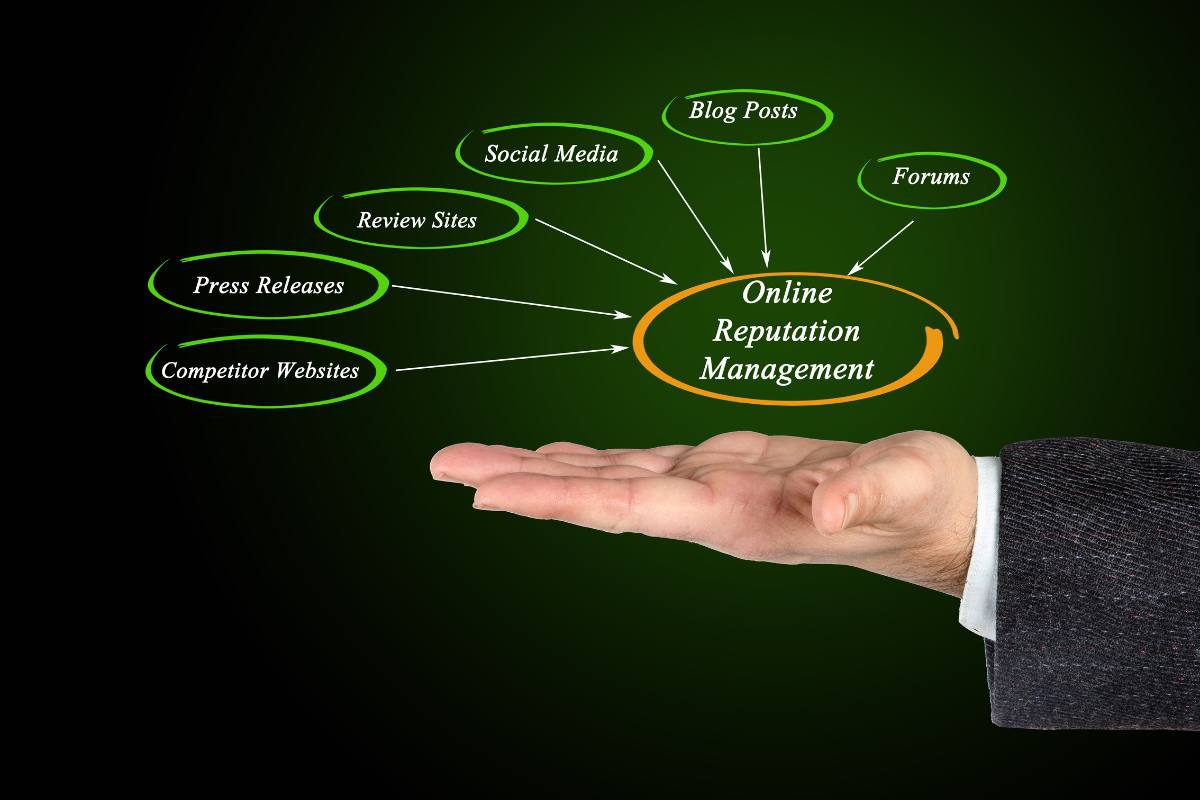
Post Title
Why Online Reputation Management Is Important for Every Business
November 24, 2024
Have you considered how crucial your brand’s online reputation really is? In a world where information spreads instantly, managing your online presence can make or break your business. Reputation management goes beyond damage control, it’s about actively shaping how your brand is perceived. Whether through strategic responses, the right tools, or leveraging SEO, taking control of your reputation is essential for success. Let’s dive into why it’s so important and how to elevate your brand image effectively.
What is Reputation Management?

Reputation management is the practice of influencing stakeholder perceptions and public conversations about an organization and its brands. It involves monitoring, addressing, and mitigating any negative content that may harm a brand's image while promoting positive aspects to enhance overall reputation. This practice can encompass various methods, from responding to online reviews to managing public relations campaigns.
The Importance of Reputation Management
Understanding the importance of reputation management cannot be overstated. A strong reputation can lead to increased customer trust, better employee morale, higher sales figures, and a more robust demand for your digital consultancy services. Conversely, a tarnished reputation can lead to lost business opportunities, lower sales, and difficulties in attracting both clients and top talent.
Key Reasons Why Reputation Management is Important
Builds Trust: A positive online reputation builds customer trust and loyalty, essential for long-term business success. For example, brands with consistently positive reviews are more likely to attract new customers who feel confident in their purchasing decisions.
Increases Visibility: Effective reputation management strategies ensure that positive content appears prominently in search results, overshadowing any negative information. Businesses that actively manage their online presence can control the narrative surrounding their brand.
Improves SEO: Good reputation management directly impacts SEO, as search engines favor brands with positive reviews and feedback. A higher ranking on search engines not only increases visibility but also establishes authority in your industry.
Enhances Customer Relationships: Proactive reputation management helps businesses address customer concerns promptly, leading to improved relationships and satisfaction. Engaging with customers and addressing their feedback shows that you value their opinions, fostering loyalty.
Attracts Talent: A strong reputation not only attracts customers but also top talent. Job seekers often research a company’s online presence before applying. A positive reputation can help a business attract high-quality candidates.
Working With A Reputation Management Agency

For businesses that lack the resources or expertise to manage their online reputation effectively, hiring a reputation management agency can be a valuable investment. These agencies specialize in monitoring online sentiments, managing reviews, conducting an online presence analysis, and crafting strategies to bolster a brand's reputation.
Benefits of Hiring a Reputation Management Agency
- Expertise: Reputation management agencies have the experience and knowledge to implement effective strategies tailored to your business. They stay updated on the latest trends and best practices, ensuring your strategy remains relevant.
- Comprehensive Monitoring: Agencies utilize various tools to monitor your online reputation across multiple platforms, ensuring no negative content goes unnoticed. This comprehensive approach allows for timely interventions when necessary.
- Crisis Management: In case of a reputational crisis, agencies can act swiftly to mitigate damage and implement damage control strategies. Their experience in handling similar situations can provide valuable insights.
- Strategic Planning: Agencies can develop a long-term reputation management plan that aligns with your overall business goals. This strategic approach ensures that your reputation management efforts contribute to broader objectives.
- Resource Efficiency: Outsourcing reputation management allows your internal team to focus on core business functions while experts handle reputation-related tasks.
Online Reputation Management Tools
The landscape of online reputation management has evolved, and several tools are available to help businesses manage their reputations effectively. These tools can assist in monitoring reviews, managing social media accounts, and analyzing public sentiment.
Popular Online Reputation Management Tools
Google Alerts: This free tool allows businesses to monitor mentions of their brand across the web, enabling them to respond promptly to new content. Setting up alerts for specific keywords related to your brand can provide immediate updates.
ReviewTrackers: A dedicated tool for managing online reviews, ReviewTrackers helps businesses monitor and respond to customer feedback across various platforms. It aggregates reviews from different sites, making it easier to manage them from a single dashboard.
Brand24: This tool tracks brand mentions and sentiments in real-time, offering insights into how customers perceive your brand. With its analytics capabilities, businesses can measure the effectiveness of their reputation management strategies.
Hootsuite: A comprehensive social media management tool, Hootsuite allows businesses to manage their online presence and respond to customer interactions efficiently. Its scheduling feature helps maintain consistent engagement.
Reputation.com: This tool specializes in online reputation management for businesses, providing services that include review management, brand monitoring, and reporting. It helps businesses understand their online reputation landscape.
Yelp for Business: Particularly important for local businesses, this platform helps manage reviews on Yelp, respond to customer feedback, and monitor online reputation within the local community.
Reputation Management Strategies

Implementing effective reputation management strategies is vital for protecting and enhancing your brand's image. Here are some proven strategies to consider:
1. Monitor Your Online Presence
Regularly monitor your online presence by tracking mentions of your brand across social media, blogs, and news sites. Tools like Google Alerts and Brand24 can help you stay informed. Setting aside time each week to review your online presence can help identify trends or issues early.
2. Manage Online Reviews
Online reviews play a significant role in shaping public perceptions. Encourage satisfied customers to leave positive reviews and address negative reviews promptly. Engaging with customers shows that you value their feedback and are committed to improving. Consider creating a follow-up process after purchases to remind customers to leave reviews.
3. Leverage SEO for Reputation Management
Integrating SEO strategies with your reputation management efforts can significantly enhance your brand's online visibility. Optimize your website for relevant keywords and ensure that positive content ranks higher than negative content. This approach can involve:
- Creating High-Quality Content: Regularly publish blog posts, videos, and other content that highlights your expertise and addresses customer concerns. This content can help establish your brand as a thought leader in your industry.
- Optimizing Meta Tags and Descriptions: Ensure that your website's meta titles and descriptions are optimized for search engines, using keywords that reflect your brand positively.
4. Engage on Social Media
Social media is a powerful platform for reputation management. Actively engage with your audience, respond to comments, and share positive stories about your brand. Building a strong social media presence can counterbalance any negative perceptions. Share behind-the-scenes content, customer testimonials, and community involvement stories to showcase your brand positively.
5. Create Quality Content
Producing high-quality, valuable content can improve your online reputation. Share informative blog posts, videos, and infographics that showcase your expertise and positively highlight your brand. Content marketing can also drive traffic to your website, boosting SEO and overall visibility.
6. Implement a Crisis Management Plan
Prepare for potential reputational crises by developing a crisis management plan. This plan should outline how to respond to negative situations, who will be involved in the response, and what channels will be used for communication. Regularly update this plan and conduct drills to ensure your team knows how to act swiftly.
Corporate Reputation Management

Corporate reputation management involves managing the reputation of an entire organization rather than just a single brand. This approach is essential for large companies with multiple divisions and public-facing brands.
Best Practices for Corporate Reputation Management
Unified Messaging: Ensure that all divisions and brands under the corporate umbrella convey consistent messaging that aligns with the organization’s core values. This consistency builds trust and reinforces a positive image.
Stakeholder Engagement: Actively engage with stakeholders, including employees, customers, and investors, to build trust and maintain a positive reputation. Regular updates and open communication channels can enhance relationships.
Crisis Preparedness: Develop a crisis management plan to address potential reputational threats swiftly and effectively. Training staff on the importance of communication during a crisis can mitigate damage.
Transparent Communication: Foster open communication with all stakeholders to build trust and credibility. Transparency in operations and decision-making processes can strengthen stakeholder relationships.
Brand Advocacy Programs: Implement programs that encourage employees and satisfied customers to become brand advocates. Their positive testimonials and recommendations can significantly enhance corporate reputation.
How to Manage Online Reputation

Managing your online reputation requires a proactive approach. Here are steps to effectively manage your online reputation:
1. Conduct a Reputation Audit
Start by conducting a reputation audit to assess your current online presence. Identify any negative content, reviews, or mentions that may impact your reputation. This audit should include a thorough review of search engine results and social media mentions.
2. Develop a Strategy
Create a comprehensive strategy to address any issues identified during the audit. Outline specific goals, tactics, and timelines for your reputation management efforts. Consider using the SMART criteria (Specific, Measurable, Achievable, Relevant, Time-bound) to set clear objectives.
3. Implement SEO Reputation Management Services
Utilize SEO reputation management services to ensure that positive content ranks higher in search results. Work with SEO experts to optimize your website and improve visibility. This process may include link building, content creation, and technical SEO adjustments.
4. Engage with Your Audience
Actively engage with your audience on social media and review platforms. Respond to comments, address concerns, and thank customers for their feedback. This engagement demonstrates that you value customer input and are committed to improvement.
5. Monitor and Adapt
Continuously monitor your online reputation and adapt your strategies as needed. Use analytics tools to track the effectiveness of your efforts and make adjustments accordingly. Regularly revisiting your strategy ensures you remain proactive in managing your reputation. According to recent statistics, 69% of businesses have faced a crisis in the past five years, yet only 45% have a formal crisis communication plan in place. How a business handles a crisis can significantly affect its reputation, making it crucial to have a proactive reputation management strategy that includes crisis preparedness.
Why Online Reputation Management Is Important

In the digital age, managing your online reputation is more critical than ever. Here are several compelling reasons why online reputation management (ORM) should be a priority for businesses:
Building Trust and Credibility
Trust is the cornerstone of any successful business relationship. Consumers increasingly rely on online reviews and social media feedback to make informed purchasing decisions. A positive online reputation fosters credibility, making it easier for potential customers to choose your brand over competitors. In fact, a study revealed that 84% of people trust online reviews as much as personal recommendations. By actively managing your online presence, you can cultivate an image that instills confidence in your audience.
Enhancing Customer Loyalty
A strong reputation can significantly enhance customer loyalty. When customers have positive interactions with your brand, they are more likely to return and recommend your services to others. Conversely, a negative online reputation can drive potential customers away, leading to lost sales and diminished brand loyalty. Managing your online reputation not only attracts new customers but also encourages repeat business from existing ones.
Mitigating Negative Impact
No business is immune to negative feedback. Whether it stems from a product issue or a poor customer service experience, how you handle these situations can make or break your reputation. An effective ORM strategy includes timely responses to negative reviews and proactive measures to address customer concerns. By doing so, you can turn potentially damaging situations into opportunities for improvement and customer engagement.
Boosting Search Engine Rankings
A positive online reputation can also improve your search engine optimization (SEO) efforts. Search engines favor websites that have a robust online presence, including positive reviews and backlinks from reputable sources. By managing your reputation and generating positive content, you can enhance your visibility in search results, making it easier for potential customers to find and trust your brand. Additionally, a strong reputation can boost conversion rate optimization by building trust and credibility, which encourages visitors to take action, whether it’s making a purchase or signing up for a service.
Crisis Management
In today's fast-paced digital landscape, a single negative review or incident can escalate quickly, potentially damaging your reputation overnight. An effective ORM strategy includes crisis management protocols to address issues as they arise. By having a plan in place, you can respond promptly and transparently, minimizing the impact of negative incidents on your brand's reputation.
SEO and Reputation Management

Search Engine Optimization (SEO) and reputation management are intricately linked, and understanding their relationship is essential for any business aiming to maintain a strong online presence. Here’s how the two intersect:
Positive Content Creation
Creating high-quality content that highlights your brand's strengths can improve both your reputation and SEO. Blog posts, articles, and social media updates can be strategically optimized with relevant keywords, helping them rank higher in search results. By showcasing your expertise and positive customer experiences, you not only build a favorable image but also improve your chances of appearing prominently in search results.
Influencing Search Results
Search engines prioritize results that reflect the overall sentiment and reputation of a brand. When potential customers search for your business, positive reviews and high-ranking content can significantly influence their perceptions. By actively managing your online reputation, you can ensure that favorable content appears at the top of search results, pushing negative information further down and reducing its visibility.
Review Management and SEO
Online reviews play a pivotal role in reputation management and SEO. Reviews not only influence consumer trust but also impact search engine rankings. Positive reviews can enhance your brand's credibility and visibility, while negative reviews can have the opposite effect. By encouraging satisfied customers to leave reviews and addressing negative feedback constructively, you can improve both your reputation and SEO performance.
Social Media Signals
Social media platforms are a critical component of online reputation management and SEO. Active engagement on these platforms can drive traffic to your website and enhance your brand’s visibility. Moreover, social media interactions often influence search engine algorithms. A strong social media presence can boost your reputation and improve your overall search ranking.
Monitoring and Analysis
Regularly monitoring your online reputation allows you to identify trends and areas for improvement. By using reputation management tools to track brand mentions, reviews, and social sentiment, you can gather valuable insights that inform your SEO strategy. Understanding how your brand is perceived online enables you to make data-driven decisions that enhance both your reputation and search performance.
Boost Your Brand’s Reputation with Visio SEO

Reputation management is more than just protecting your brand, it's about building a strong foundation of trust and credibility in the ever-competitive digital world. At Visio SEO, we understand the critical role a positive online presence plays in your business success. By leveraging proven reputation management strategies and incorporating advanced SEO techniques, we can help you enhance your brand’s image, improve visibility, and foster stronger relationships with your audience.
Whether you prefer to manage your reputation internally or seek expert guidance, Visio SEO’s reputation management services are designed to safeguard and elevate your brand. Investing in your reputation today will position your business for long-term success and growth. Let Visio SEO help you pave the way for a brighter future! Contact Visio SEO to get started!
Contact Us
Contact Us
We will get back to you as soon as possible
Please try again later
Subscribe to Our Newsletter
Stay up to date with our latest offers and promotions by signing up now!
Contact Us
We will get back to you as soon as possible.
Please try again later.

We are the premier digital marketing solution in Elgin. Contact us today to get your free, no-obligation consultation!










